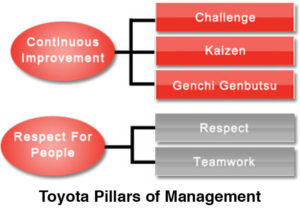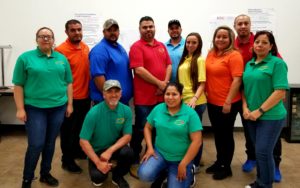Teams have been a long-held convention of successful business based on the idea that two heads are better than one or that together we can do more. But despite the best planning, it is easy to slip into top-down management strategies where managers at multiple levels dictate strategy to employees who may not understand the why—yet have full responsibility for the how.
 One of the business and manufacturing industry’s best examples of team-based management is Toyota’s adoption of the Toyota Way. In striving to consistently and most efficiently develop quality cars, Toyota focused on its people and the collaboration between them to reduce waste in both time and materials. The process embraced a new set of values that included respect for people and continuous improvement that was rooted in the idea of teamwork. This fundamental change in its manufacturing systems provided not only deep training and education but also empowerment of employees at every level of the manufacturing process. Today, Toyota is a best-in-class example of quality and success that is the envy of other manufacturers. In fact, Toyota repeatedly outperforms its competitors in the areas of quality, reliability, productivity, cost reduction and more, thanks to their employees’ constant focus on how to do better.
One of the business and manufacturing industry’s best examples of team-based management is Toyota’s adoption of the Toyota Way. In striving to consistently and most efficiently develop quality cars, Toyota focused on its people and the collaboration between them to reduce waste in both time and materials. The process embraced a new set of values that included respect for people and continuous improvement that was rooted in the idea of teamwork. This fundamental change in its manufacturing systems provided not only deep training and education but also empowerment of employees at every level of the manufacturing process. Today, Toyota is a best-in-class example of quality and success that is the envy of other manufacturers. In fact, Toyota repeatedly outperforms its competitors in the areas of quality, reliability, productivity, cost reduction and more, thanks to their employees’ constant focus on how to do better.
In agriculture, we have a similar conundrum to Toyota. We have a labor-intensive business in which we are tasked to grow, harvest and pack high-quality, fresh produce on a daily basis and make sure it is safe and consistent. Those responsible for that task are the millions of farmworkers who make it happen.
Anyone who has harvested a fresh produce crop knows the high level of skill required to be a farmworker. It is imperative to be fast, delicate and accurate while making split-second decisions about the millions of pieces of produce being harvested. Given our industry’s food safety challenges, we also need to rely on farmworkers to identify, mitigate and respond to food safety risks. But if a farm is relying on the commonplace top-down management style, most workers will know the how of their work without the why. They are also not likely to experience two important principles from the Toyota Way: being invited to provide feedback on how to improve processes or collaborating across units to drive efficiency and quality.
 At EFI, we help farms introduce and adopt principles and philosophies from the Toyota Way through workforce development and farm-based Leadership Teams. Cross-functional, multi-demographic teams bring together workers from all departments and levels of the farm to foster collaboration. The teams are trained in the soft skills of leadership, communication, problem-solving and conflict resolution, and then they work on breaking down barriers, creating a positive workplace environment and addressing compliance and performance issues.
At EFI, we help farms introduce and adopt principles and philosophies from the Toyota Way through workforce development and farm-based Leadership Teams. Cross-functional, multi-demographic teams bring together workers from all departments and levels of the farm to foster collaboration. The teams are trained in the soft skills of leadership, communication, problem-solving and conflict resolution, and then they work on breaking down barriers, creating a positive workplace environment and addressing compliance and performance issues.
Christy Getz, a Cooperative Extension Specialist with the University of California, Berkeley, made the following remarks about EFI’s Leadership Team model:
“EFI’s labor management model is rarely found in agriculture. The most notable difference between farms that incorporate Leadership Teams is increased, more respectful and more constructive communication both between management and workers and among workers themselves. This type of increased and improved communication has benefits such as increased transparency about farm-level decision-making, increased opportunities for collaborative problem-solving and a decreased fear of retaliation for airing problems or concerns through leadership team-related channels.”
If you are looking for ways to drive efficiencies and collaboration or to help your managers include workers in the why as well as the how, then consider bringing the Toyota strategies and philosophies to your farming operation with EFI workforce development.
For more information about workforce development and building Leadership Teams for fresh produce companies, visit www.equitablefood.org/certification.

